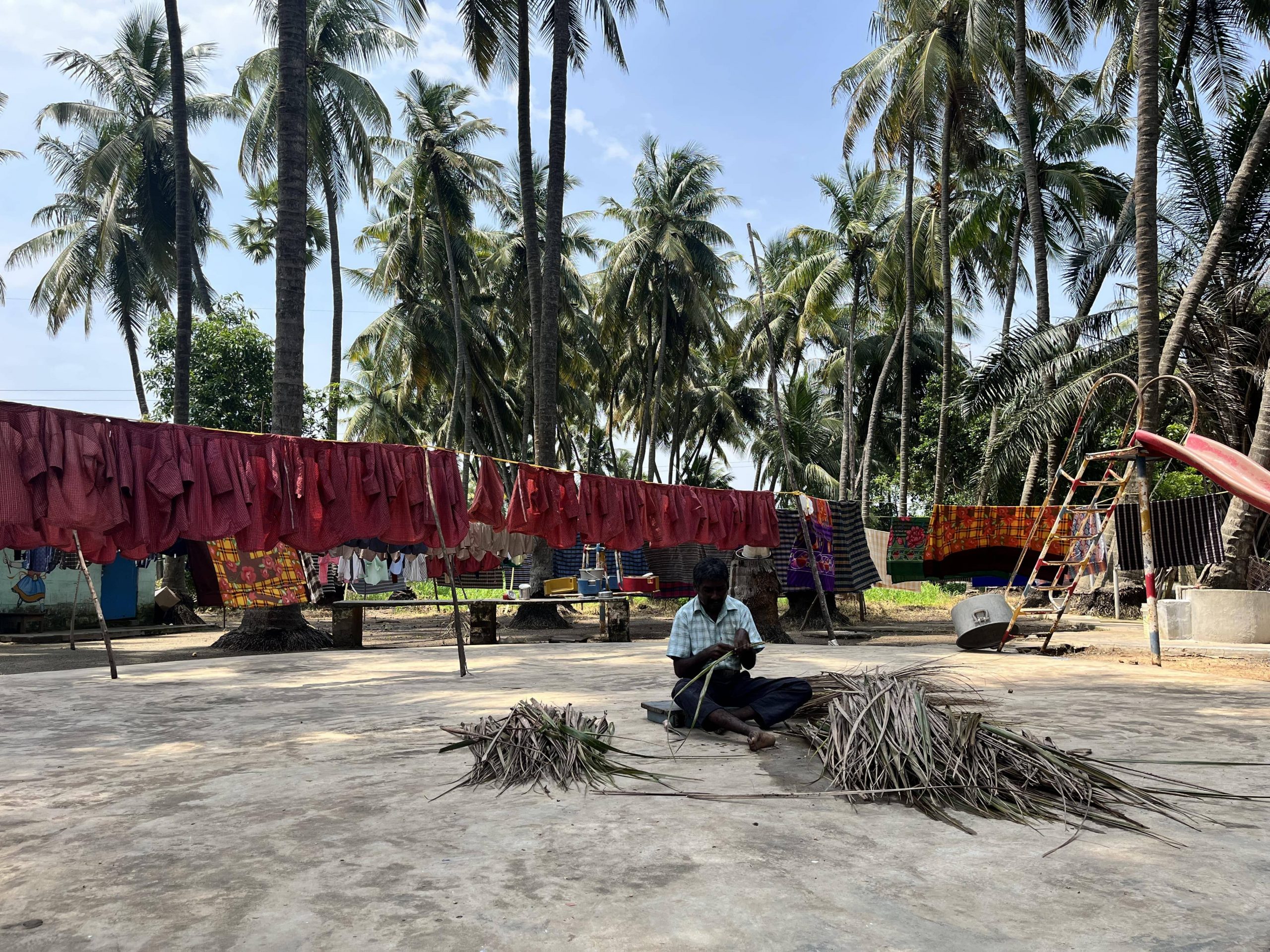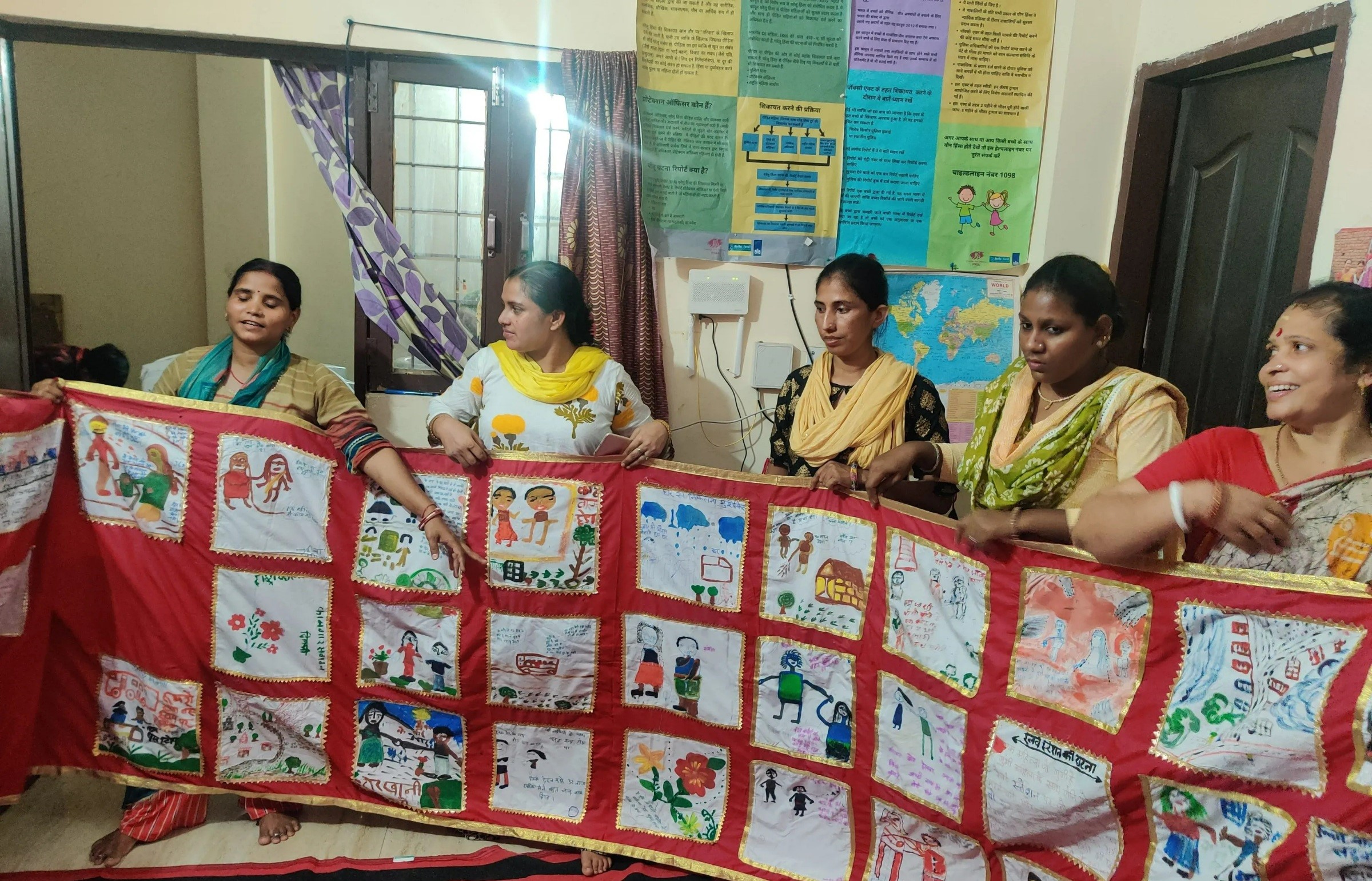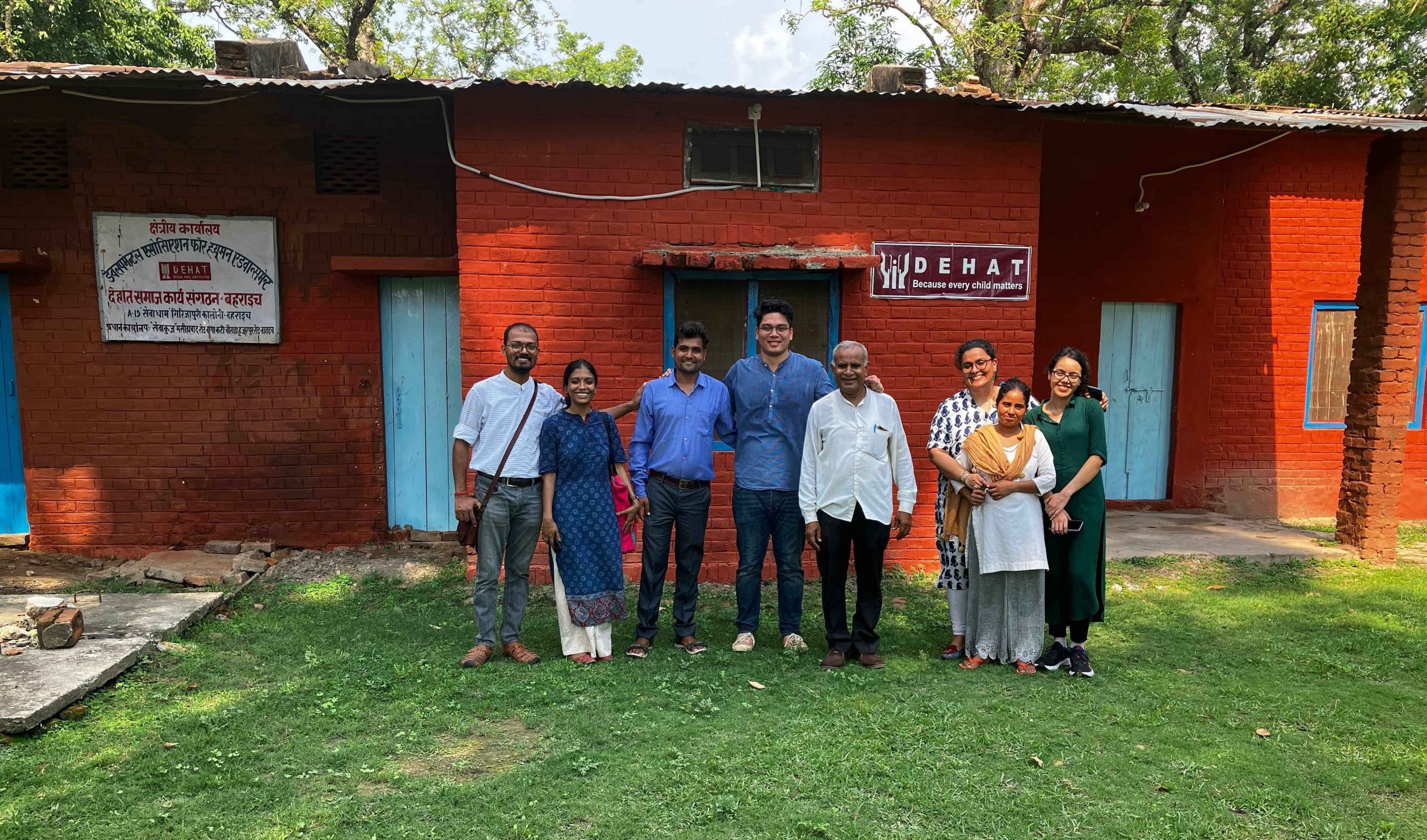Andhra Pradesh, often called the “Rice Bowl of India”, is an agrarian state with 37% of the total geographical area of the state being cultivated. The region faces frequent climate-related challenges such as unseasonal rainfall and floods, which disrupt agriculture cycles and affect the community’s economic stability.
In the East Godavari district of Andhra Pradesh, nestled on the banks of the river Godavari, is the town of Rajahmundry. Known for its picturesque landscapes covered in paddy fields, golden sunsets and various places of worship, Rajahmundry serves as a hub of trade and culture for the surrounding districts. Santhivardhana Ministries operates in these very districts, namely Pulimeru and Annavaram that tell a contrasting story to the economic hub of Rajahmundry.
There are more than a thousand villages in all of Pulimeru and Annavaram, these villages are home to the Mala and Madiga communities. Geographically isolated with poor infrastructure and limited transportation, making access to healthcare and education challenging for the already vulnerable community members. These challenges are further aggravated for persons with disabilities (PwDs). Having faced similar challenges due to Polio, Veerababu dedicated himself to working with children and persons with disabilities to enable economic integration into society.
“I have faced many challenges due to my disability. There is a lot of stigma that often surrounds persons with disabilities (PwDs). Society tends to respond with sympathy, but for me, true resilience will come when people move beyond sympathy towards empathy. I envision a future where people with disabilities are fully included, and there is 100% employment for PwDs, acknowledging their capabilities and contributions” – Veerababu, Founder of Santhivardhana Ministries
Understanding Reasons for the Prevalence of Disability in the Region
According to the National Family Health Survey-5, 59% women aged 15-49 in Andhra Pradesh have anemia which exacerbates the vulnerability of expecting mothers, further heightening risks to child development. Children of mothers with anemia are also likely to have anemia, 63% of children aged 6 to 59 months have anemia in the region.
Santhivardhana Ministries supports children and adults aged 8 to 25 with mild to profound physical and intellectual disabilities such as Autism, Cerebral Palsy and others across villages. Staff members are trained to conduct door-to-door visits, identifying cases of nearly 10 to 15 individuals with disabilities per village. From conversations with the team, we understood that the region’s high disability rates are linked to three main factors.
First, intra-familial marriages, which are common, often lead to genetic complications, increasing the risk of disabilities.
Second, early marriages, frequently child marriages, followed by early and consecutive pregnancies further increase this risk.
Third, limited awareness of maternal nutrition and healthcare, including vaccinations and routine check-ups, contributes to the high prevalence of disabilities in Pulimeru and Annavaram.
Santhivardhana Ministries’ Approach towards (Dis)ABILITY
Given the sensitive nature of the challenges, Santhivardhana Ministries adopts a triangulated approach to supporting individuals with disabilities, addressing their needs comprehensively.
At the core of their model is the inclusive residential school, where children and people with disabilities receive not only inclusive education but also physiotherapy care and nutrition tailored to their specific needs. The teaching methods, curriculum design, evaluation processes, and overall goals of inclusive education differ significantly from those in mainstream education. Along with imparting knowledge, they are focused on promoting self-reliance and enhancing mobility, such that individuals reach their full potential.

At the Santhivardhana Residential school in Pulimeru, children begin their education in pre-primary, gradually advancing to Primary 1 and Primary 2 learning basics like numbers, body parts, and letters through interactive toys. At the Secondary 1 and 2 level, they develop skills such as reading time and braille in the local language. The Pre-Vocational 1 and 2 and Vocational grades focus heavily on skill development, particularly through arts and crafts.

While the education curriculum is geared towards enabling livelihoods for PwDs to the degree possible, the type of jobs differ significantly. Individuals spend 2 years on average in a grade and in addition to vocational skills, there is also a strong emphasis on building interpersonal and communication skills, ensuring that individuals are well-prepared for both work and daily life.

Currently there are close to 100 individuals receiving education, care and support at the school in Pulimeru. The organization also helps persons with disabilities (PwDs) access government job opportunities. To date, it has successfully trained and placed approximately 10 individuals with visual and physical impairments in government positions.
However, this becomes increasingly difficult for people with severe or profound disabilities. The organization also has a residential school in Annavaram which is dedicated to children with disabilities (CwDs) from tribal families that largely live in the villages close by these families requested that a school be set up nearby. Most of the tribal children at this school have multiple physical and intellectual disabilities that are profound in nature. Despite this, through the care provided by the organization, children are able to not only be independent but also extend support to their peers helping in their development.
Recognizing that not all children with disabilities may be able to access the school due to unique limitations, the organization extends support beyond the school to home-based care. Staff members provide ongoing care in the home environment, recognizing that consistent support is essential for long-term progress. This includes home visits by trained professionals who offer physiotherapy sessions, monitor progress, conduct health check-ups and adjust care plans to suit the needs of the individual.
The third pillar of support ensures that children have access to a support system in the absence of the organization by capacitating parents with skills and knowledge. Through training sessions and counseling, parents are taught how to provide basic physiotherapy, assist with daily activities, and advocate for their children’s rights and needs. Government benefits exist for PwDs provided they hold a Unique Disability Identity Card (UDID).
The process to obtain a UDID takes about 45 days and requires medical diagnosis, which is often expensive. With a UDID, individuals can benefit from travel subsidies, including one free ticket and a 50% discount on a second ticket for bus and train travel. Additional benefits include schemes like Niramaya – insurance for persons with disabilities, provided by the central government. Santhivardhana Ministries hand holds parents through the entire process of obtaining a UDID to ensure maximum support for their children.
While all parents are trained to provide appropriate care and support to their children, most prefer enrolling their children in the residential schools of Santhivardhana Ministries.
“During parent-teacher meetings, parents tell us that after living at the school their children are able to open up freely and communicate better. Children like it here because they are able to connect with and help each other out through similar problems. Seeing their independence develop, parents feel happy and confident and also recommend the school to more parents” – Laxmi (Consultant at Santhivardhana Ministries) and Sathya (School Principal).
Enabling an Ecosystem of Support through Livelihoods: Towards Economic Integration
Beyond capacitating parents of children with disabilities, Santhivardhana Ministries recognized the need to enable economically sustainable livelihoods for families so that they are better able to provide for their children’s needs in the long-term.

Since most of the communities are agriculture dependent and rice is the staple, it is lucrative for farmers to grow paddy. However, due to the climatic vulnerability of the region, farmers diversify crops by including millets, vegetables and flowers for which Santhivardhana Ministries provide access to subsidized seeds, fertilizers and raw materials. Unlike paddy for which linkage to market is easy through government run centres, channels for millets and vegetables are limited and distant and so the organization facilitates market linkages for the same.

One approach being considered is offering value-added training to farmers, enabling them to create products like pickles, jams, and spice blends from millet and vegetable produce. These items have a longer shelf life, making them easier to sell in local markets. The long-term goal is to collectivize farmers into a Farmer Producer Organization (FPO), allowing them to market and sell their products independently and more effectively.
The organization also offers a revolving loan for parents of CwDs. This initiative provides low-interest loans to families, enabling them to start small businesses or invest in agricultural resources. The interest from these loans is reinvested to fund additional loans for more families, creating a sustainable cycle of seed capital for alternative livelihood options.
Impact of Rebuild India Fund : Livelihoods for Adolescent Girls
To cater to the emerging needs of the larger community identified through focused group discussions, Santhivardhana Ministries has used flexible funds to introduce a new skill-development program for women and adolescent girls.

The organization has established a tailoring unit that offers a 6-month course, with each batch consisting of 30 women. Currently 60 women are enrolled. What sets this program apart is its structured approach. Each student is provided with a personalized coursebook, outlining the various designs they will learn, such as frocks, blouses, pants, and shirts. The training begins with fundamental stitching techniques, including buttoning and sewing hooks, and regular tests are conducted to ensure students are ready to advance to the next level.
To ensure that the training translates to economic independence, students have the option to purchase a sewing machine from the organization through an Equated Monthly Instalment (EMI) plan upon completion of the course.
Additionally, the organization has also purchased two she-buffaloes to provide sufficient milk which is crucial from a nutritional standpoint for the children at the residential school.
Future Plans: extending support to diverse communities
Supporting children and persons with disabilities (PwDs) and their families continues to be a focus area for Santhivardhana Ministries. Along with this, the organization plans to expand its work on livelihoods and residential support to include communities in the region.
- Livelihoods for PwDs through sanitary pad manufacturing– Santhivardhana Ministries aims to establish a sustainable livelihood initiative for PwDs through the production of sanitary pads. With a sanitary pad-manufacturing machine already in place and branding and packaging designs ready, the organization is seeking partnerships with vendors for raw materials and organizations interested in purchasing their products and plans to collaborate with local government schools to install pad vending machines.
- A safe-haven for the elderly – Recognizing the increasing vulnerability of senior citizens in rural areas as youth migrate for job opportunities, the organization envisions converting its old and currently unused residential school premises into a dedicated old age home. This initiative aims to provide a safe and supportive environment for the elderly, ensuring they have access to necessary resources and companionship.
- Extending support to the LGBTQIA+ community– Building on the relief support provided during the pandemic, Santhivardhana Ministries aims to work collaboratively with the LGBTQIA+ community, offering resources and programs that promote inclusion. This initiative reflects dedication to addressing the needs of all marginalized groups, fostering an environment of dignity and respect.
Santhivardhana Ministries is building a community where persons with disabilities are not just cared for but actively included in everyday life. Through education, skill-building, and livelihood programs, the organization is enabling individuals and families to be self-sufficient. All this while also acknowledging that development and independence can look different for every person and child with disability. Santhivardhana’s approach pushes us to reflect on our understanding of scale-ready solutions as building an inclusive ecosystem requires depth, nuance and long-term support.



